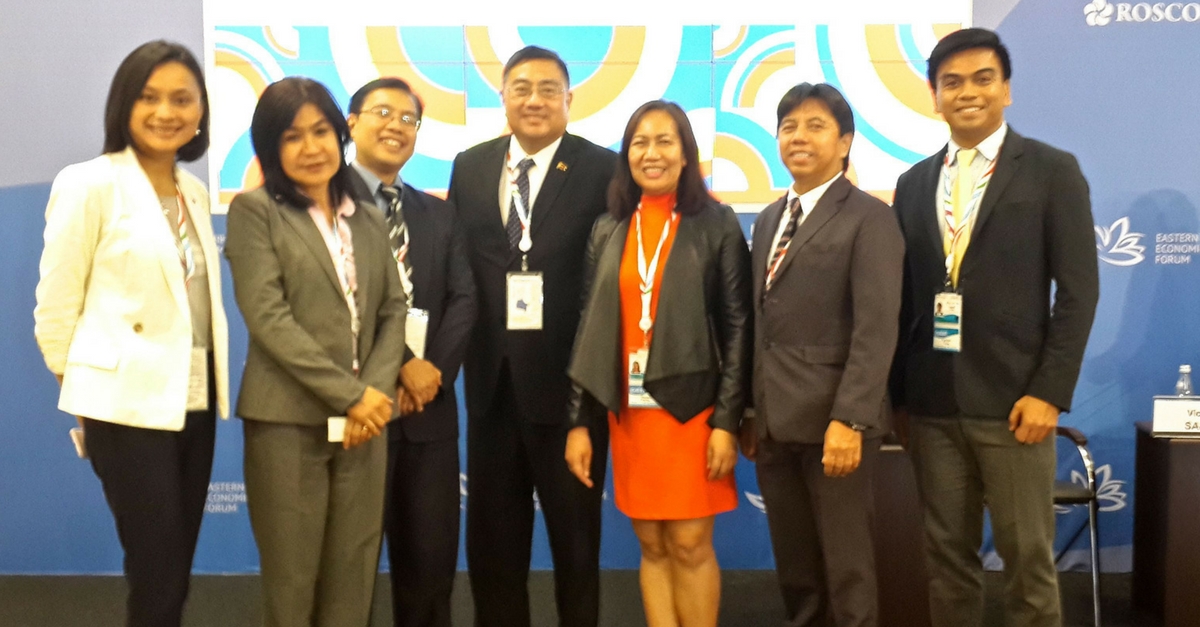 Dr. Raquiza (second from left) with Filipino participants in the Russia-ASEAN University forum.
Dr. Raquiza (second from left) with Filipino participants in the Russia-ASEAN University forum.
Dr. Antoinette R. Raquiza, Associate Professor at the UP Asian Center, attended the Russia-ASEAN University Forum, held on 1-2 September 2016 at the Far Eastern Federal University campus in Vladivostok upon the invitation of the Moscow State Institute of International Relations (MGIMO University) and Far Eastern Federal University (FEFU). The Forum was aimed at promoting shared development and security, academic cooperation, as well as greater cultural understanding between Russia and the Southeast Asian countries.
The two-day activity brought together more than 100 government officials, education experts, business leaders, and academics from Russia and ASEAN countries to discuss common concerns in the fields of regional security, science and business education, culture, and university management. Organized by the ASEAN Centre of the MGIMO University, Russian Ministry of Foreign Affairs, and FEFU’s Oriental Institute-School of Regional and International Studies, the discussions highlighted the important role that universities and think tanks play in promoting Track II diplomacy, knowledge-production and sharing, and community-building.
Dr. Raquiza noted that the Forum signals Russia’s growing interest in raising its visibility and presence in East Asia and, notably, Southeast Asia. The Forum followed in the heels of the Sochi ASEAN-Russian Summit last May and was held alongside the Eastern Economic Forum (EEF), which was attended by world leaders, notably, Russian President Vladimir Putin, Japan Prime Minister Abe, and South Korean President Park. That Vladivostok, located in the southernmost part of the Far Eastern Region, was the venue for both forums was symbolic as it highlights Russia’s territorial reach into Asia. Equally significant, this year marks the 20th anniversary of ASEAN-Russia relations. According to Dr. Raquiza, whether Russia will present a distinct pole in the changing power relations in the region bears watching.
Besides Dr. Raquiza, the Philippine participants included: UP Professor Alex Brilliantes who represented the Philippine Commission of Higher Education; Dr. Carlos Tabunda of the Development Academy of the Philippines and the New Era University; and, Drs. Rhonda Padilla and Engelbert Pasag of the Panpacific University North Philippines. Philippine Ambassador to the Russian Federation Carlos Sorreta and Vice Consul Luningning Camayo also attended the Russia-ASEAN University Forum and EEF.
Antoinette R. Raquiza, Ph.D. is Associate Professor at the Asian Center, University of the Philippines Diliman, where she teaches Asian studies. She heads the Asian Center’s “Bugkos” research program that examines emerging development patterns, processes, and paradigms, defining Asia and the Philippines in transition. Dr. Raquiza earned her PhD in Political Science at the City University of New York Graduate Center and is the author of State Structure, Policy Formation, and Economic Development: The Political Economy of Thailand and the Philippines (Routledge 2012). VIEW FULL PROFILE.
The UP Asian Center offers M.A. degrees in Asian Studies with four fields of specialization: Northeast Asia, Southeast Asia, South Asia, and West Asia. The Center also has an M.A. program in Philippine Studies that allows students to major in Philippine society and culture, Philippine foreign relations, or Philippine development studies. The Center offers a Ph.D. program in Philippine Studies in conjunction with the College of Arts and Letters and the College of Social Sciences and Philosophy. Get an overview of these programs. The Asian Center also houses a peer-reviewed, open-access journal, Asian Studies: Journal of Critical Perspectives on Asia. It has published several books and monographs, and hosts or organizes various lectures and conferences.

